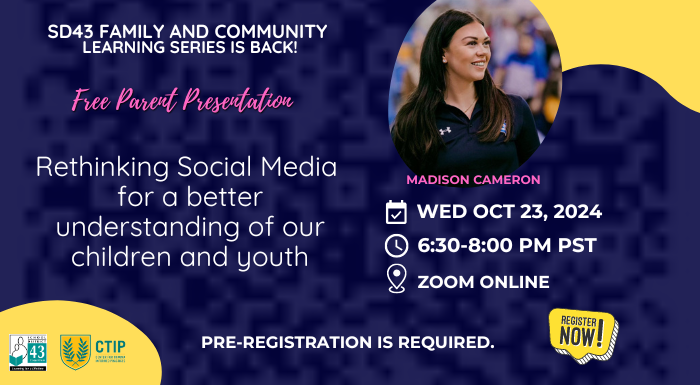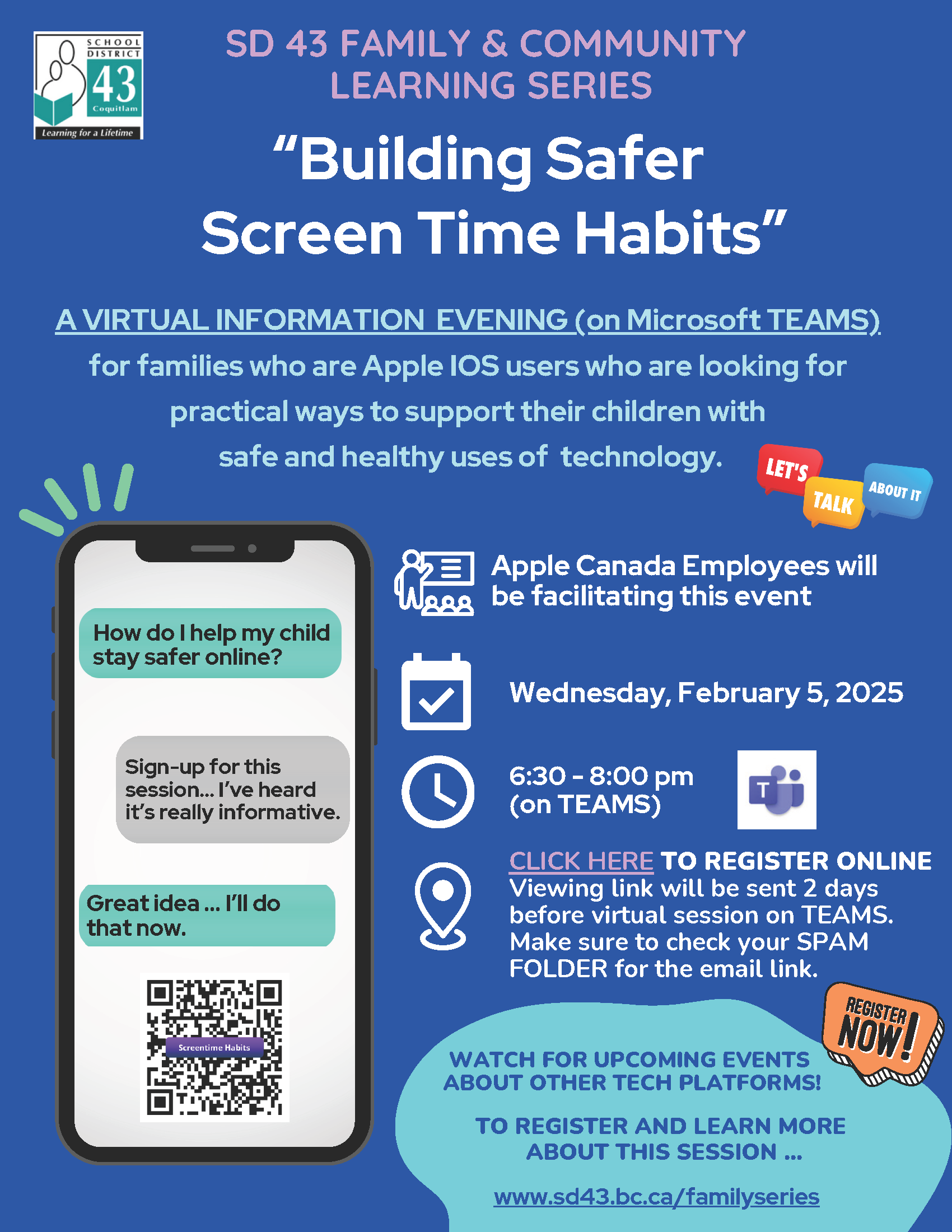Family & Community Learning Series 2024-25
WHY IS LEARNING ABOUT SCREEN TIME HABITS BENEFICIAL TO WELLNESS?
Learning more about screen time habits is important for several reasons:
- Informed Decision-Making: Understanding the impact of screen time helps individuals make informed choices about their digital consumption, balancing screen use with other activities.
- Health and Well-being: Knowledge about screen time effects can lead to better physical and mental health. For instance, reducing screen time before bed can improve sleep quality.
- Productivity and Focus: Being aware of how different types of screen use affect productivity and cognitive function can help people manage their time more effectively.
- Social Interactions: Learning about screen time habits can enhance social skills by encouraging more face-to-face interactions and reducing reliance on digital communication1.
- Personal Growth: Understanding the nuances of screen time can foster personal growth by promoting activities that stimulate creativity and critical thinking.
By teaching healthy screen time habits, we can help individuals make informed decisions about their screen use, promoting a balanced lifestyle that supports overall well-being and development.
Screen time refers to the amount of time spent using electronic devices with screens, such as smartphones, tablets, computers, and televisions. It typically includes activities like browsing the internet, watching videos, playing games, and using social media. Many people are concerned about excessive screen time, especially for children, as it can potentially have negative effects on physical and mental health, sleep patterns, and social interactions. Various tools and techniques exist to help individuals monitor and manage their screen time to ensure a healthy balance with other activities.
Digital media is the content transmitted over the Internet or computer networks on all devices.
Recommended Screen Time Guidelines:
- Children aged 2 to 5 years: Limit screen time to no more than one hour per day of high-quality programming, and co-view with them to help them understand what they are watching.
- Children aged 6 years and older: Establish consistent limits on screen time and ensure that it does not interfere with adequate sleep, physical activity, and other behaviors essential to health.
- Excessive screen time can have negative effects on children’s health and development.
- Children who spend too much time in front of screens are at risk of becoming overweight, experiencing sleep deprivation, being less school-ready, having reduced attention spans, and struggling with self-soothing.
Creating Healthy Habits
Set Limits: Establish rules and share them with other adults in your child’s life. For children younger than 2 years, avoid screen time altogether. For ages 2 to 5, limit it to less than 1 hour per day.
Be a Good Example: Model healthy screen time habits by engaging with your child through play and books rather than screens.
Encouraging Activities to Engage in instead of spending time on screens:
- Sports: Soccer, basketball, baseball, tennis, swimming, cycling, skateboarding, and other organized sports or recreational activities.
- Nature exploration: Hiking, camping, birdwatching, fishing, exploring local parks, or simply going for a walk in nature.
- Outdoor games: Tag, hide and seek, capture the flag, kickball, Frisbee, hopscotch, jump rope, or creating obstacle courses.
- Gardening: Planting flowers, vegetables, or herbs in a garden or pot, and learning about the natural world through hands-on experience.
- Creative play: Building forts, making nature art, collecting leaves or rocks for crafting, or engaging in imaginative play outdoors.
- Adventure activities: Rock climbing, zip-lining, ropes courses, or any other outdoor adventure sport available in your area.
- Water activities: Swimming, kayaking, paddleboarding, surfing, or simply playing in a sprinkler or with water toys on a hot day.
- Community events: Participating in community sports leagues, attending outdoor concerts, festivals, or farmers markets, or volunteering for environmental clean-up efforts.
These activities not only provide physical exercise but also foster creativity, curiosity, and a deeper connection with the natural world.
It's also essential to consider the quality of screen time. Not all screen activities are equal; educational and interactive content can be more beneficial than passive consumption like watching cartoons or playing simple games. Additionally, parents should encourage a balanced lifestyle that includes physical activity, social interaction, and other forms of learning and entertainment. Ultimately, parents and caregivers should tailor screen time limits to their child's individual needs and monitor their impact on their overall well-being.
Resourceful Links to Learn More:
Documentaries to Watch:
SD43 PARENT RESOURCES | DIGITAL CITIZENSHIP & ONLINE SAFETY


.png)
What the event was about:
- Awareness & Identification – Recognizing signs of human trafficking, different forms of exploitation, and how traffickers target vulnerable youth online.
- Prevention & Safety – Strategies for protecting children, fostering open communication, and building trust to encourage reporting.
- Resources & Support – Accessing local and national services, hotlines, and community initiatives to support victims and prevent trafficking.